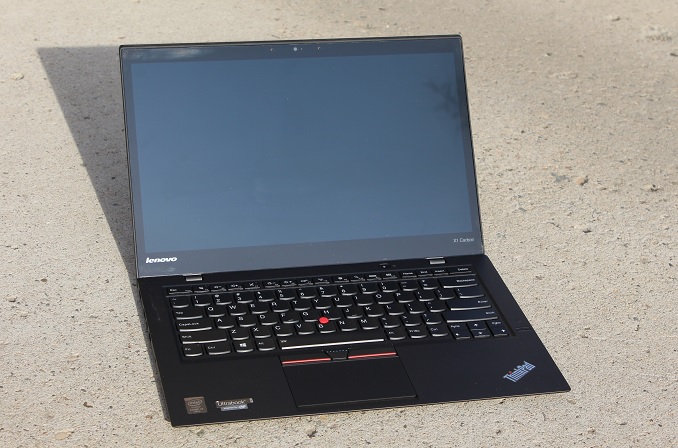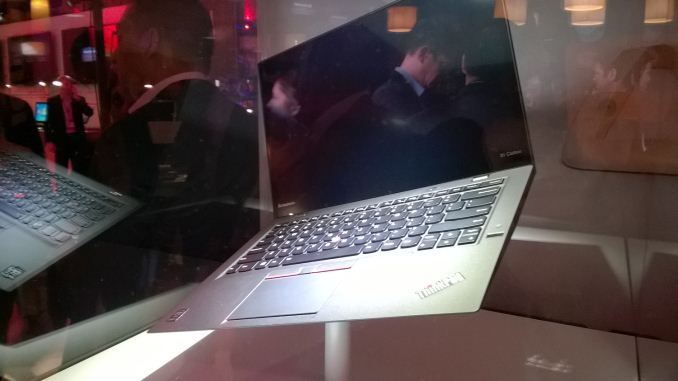The Lenovo ThinkPad X1 Carbon Review (2015)
by Brett Howse on May 21, 2015 8:00 AM EST- Posted in
- Laptops
- Lenovo
- ThinkPad
- Ultrabook
- Broadwell-U

In January of this year, I walked into the Lenovo booth at CES and almost immediately to the right there was a large display case set up, and inside was Eve. Eve looked great in the case all dressed in black, and was well attended to by her hosts. Eve is the one hundred millionth ThinkPad to be created, and I remarked at the time that it was likely not an accident that Eve is a ThinkPad X1 Carbon.
Eve, the 100,000,000th ThinkPad
The X1 Carbon has been Lenovo’s flagship ThinkPad since it was launched, and it brings the world of the ThinkPad business class notebook down into a much thinner and lighter form factor. Today we have the third generation of the X1 Carbon, and although the competition for the best Ultrabook keeps increasing, Lenovo brings a lot to the table with the X1 Carbon.
Lenovo keeps the ThinkPad lineup outfitted with features that the average consumer does not need, and the price is higher accordingly. But if you are someone who travels a lot, and needs a full featured notebook with all of the goodies, you can find it in this X1 Carbon. While the Ultrabook initiative started out with smaller devices, it gradually worked its way up to include larger notebooks as well, and the X1 Carbon certainly fits the bill for an Ultrabook despite the larger than average 14 inch display.
Despite the somewhat larger chassis, the X1 Carbon keeps the weight in check partially through the use of its namesake – carbon fiber. The display cover is created with carbon fiber reinforced plastic, and glass fiber reinforced plastic. This lets the display be lighter, thinner, and stronger than one made of aluminum or plastic alone. And it is strong. You can certainly flex the display, but it never feels like you are going to bend it by accident. The bottom of the X1 Carbon is made of aluminum and magnesium, so it is plenty strong as well. Lenovo even points out that the X1 Carbon has passed eight MilSpecs with fifteen individual tests, including shock, vibration, temperature, humidity, and silica dust exposure.
For many devices, 2015 is the year of the spec bump to Broadwell based processors, and Lenovo is not immune to this. Luckily that is a good thing though, and the new X1 Carbon is now powered by the latest Broadwell-U based processors from Intel. Buyers get a choice of the i5-5200U, i5-5300U, or the i7-5600U processor. None of these are slow, but luckily Lenovo has sent us the i7 model so we can get a feel for how it competes against some of the other Broadwell devices we have seen this year. Let’s take a look at the full specifications below.
| Lenovo ThinkPad X1 Carbon (2015) | |||||
| As Tested, Core i7-5600U, 8 GB RAM, 512 GB SSD, 2560x1440 IPS display with Touch | |||||
| Processor | Intel Core i5-5200U (2C/4T, 2.2-2.7GHz, 3MB L3, 14nm, 15w) Intel Core i5-5300U (2C/4T, 2.3-2.9GHz, 3MB L3, 14nm, 15w) Intel Core i7-5600U (2C/4T, 2.6-3.2GHz, 4MB L3, 14nm, 15w) |
||||
| Memory | 4GB or 8GB DDR3L-1600Mhz | ||||
| Graphics | Intel HD 5500 (24 EU, 300-900 MHz on i5, 300-950 Mhz on i7) | ||||
| Display | 14.0" 1920x1080 TN Optional 2560x1440 IPS Optional Mult-touch |
||||
| Storage | 128GB SATA SSD 180GB or 256GB SATA SSD with Opal 2 Support 512GB PCIe SSD Samsung SM951 |
||||
| Networking | Intel Dual Band Wireless-AC 7265 (802.11ac, 2x2:2, 866Mpbs Max, 2.4 and 5GHz) | ||||
| Audio | HD Audio, Realtek ALC3232 codec Stereo Speakers (downfiring) 1 watt x 2 dual array microphone |
||||
| Battery | 50 Wh Battery 45 Watt charger |
||||
| Right Side | USB 3.0 Ethernet Extender |
||||
| Left Side | USB 3.0 Ports Headset Jack Mini-DisplayPort HDMI Power and OneLink Connector |
||||
| Dimensions | 331 x 227 x 18.5mm (13.03 x 8.94 x 0.73 inches) | ||||
| Weight | 1.27-1.45 kg (2.8-3.2 lbs) | ||||
| Extras | 720p Webcam Backlit Spill-Resistant Keyboard |
||||
| Pricing | $1088-$2300 USD (As Tested: $2100) | ||||
Since this device falls into the ThinkPad line, you get a lot of customization options when purchasing that Lenovo does not do for their consumer models, and that is very welcome because on a lot of devices if you want feature X you have to also buy features Y and Z, which can really bump up the costs. However a few things need to be called out on the X1 Carbon. This is a premium Ultrabook, so it is a bit sad that in 2015 the base model is still offered with just 4 GB of memory, and because this is soldered on (like all of these very thin devices) it would be money well spent to just add the extra $75 Lenovo charges for the 8 GB model. Luckily even though Lenovo calls it 1x8 GB in the guide, it is in fact dual-channel memory. The other big complaint is the 1080p model is offered with a TN panel. That is not really acceptable in a $1000+ device in 2015 any longer. Moving to the QHD version of the panel for $150 would be money well spent since that will bring you an IPS panel.
There are also a lot of options for storage, and the base model comes with just a scant 128 GB of SSD space available, but for not too much more you can bump that up to 180 or 256 GB. For those that need even more storage space and speed, Lenovo offers the SM951 equipped 512 GB PCIe based Samsung SSD. When the X1 first launched, it was a hefty $700 upgrade, but now it is a mere $425 over the base 128 GB offering.
The X1 Carbon is even offered with optional LTE connectivity, via the Sierra EM7345, for those that need mobile data connectivity without tethering.











103 Comments
View All Comments
digiguy - Thursday, May 21, 2015 - link
These are ULV CPUs, they will never close the cap with desktops CPUs, even from a couple of generations ago (provided we are speaking of the same line, that is i7). My 3rd gen quad core laptop CPU is much more powerful than this and even my 2nd gen dual core i7 ultrabook is almost on par with this thanks to a higher (35W) TDP. Having said that a comparison with quad core mobile CPUs would be interesting to see the difference with the best ULVs.nerd1 - Friday, May 22, 2015 - link
If you don't utilize more than 3 cores (few application does) they are actually comparable.Valantar - Thursday, May 21, 2015 - link
Great review! It's good to see how this ultra high end ultrabook is evolving alongside others, even if it still has some of the same issues as before.Now, could you, beg, borrow or steal a similarly specced X250 from Lenovo for comparison? It's an interesting parallell between the two, with the X1 Carbon having a larger screen, m.2 storage and slimmer build, while the X250 is more upgradeable (SODIMM RAM! up to 16GB!), has an intriguing battery solution (both an internal 23.2WHr and a replaceable 23.2-72WHr one, for a total 46-95WHr(!) capacity) and is of course slightly cheaper. I'd love to see an Anandtech review of the follow-up to my beloved X201.
vision33r - Thursday, May 21, 2015 - link
Imo, Lenovo killed Thinkpads today because of shoddy quality and poor software. To allow even malware to their factory software and driver builds tells you they are not thinking about quality.Dells and HP corporate level hardware is better today than Lenovo. Because the BIOS and software provided by HP and Dell are simpler and more stable. There are too many issues with Lenovo firmware and BIOS today. Out of 150 that we received, probably 7-8 will have stability problem using a Windows 8.1 Gold image that we deploy tells you something.
Hulk - Thursday, May 21, 2015 - link
I bought a Lenovo t450s a few months ago and have been very happy with it.And yes it was loaded with tons of crap. I just wiped it and started over. Now it's nice and clean.
BMNify - Thursday, May 21, 2015 - link
Lenovo thinkpad desktop and laptops and other enterprise machines were never loaded with adware, it was a consumer line problem which was rectified. The fact that you have to resort to blatant 100% lies completely invalidates your rant against Lenovo.chizow - Thursday, May 21, 2015 - link
We've had a few X1 Carbons come through, and while it is a solid piece of hardware, just be ready for UEFI and various other issues due to the lack of built-in network adapter if you are using/deploying it in an enterprise environment. Had to work through a few issues with our PXE server and UEFI boot as well, but nothing too bad.Overall Lenovo have been solid for us, lots of X230/X240 in our environment, the only major complaint I have is the amount of overlay/proprietary bloat Lenovo has to use basic functions like WiFi, BT, projectors.
Personally, I vastly prefer Dell Latitude series, especially the latest E7250 and E7250. Amazing keyboards, I've always preferred Dell's keyboards even compared to MacBook chiclets, but now you get the same Dell feel with full chiclet keys.
GeorgeH - Thursday, May 21, 2015 - link
? All X1s have both wired and wireless network adapters.wintermute000 - Thursday, May 21, 2015 - link
I hate it how my T440 has a bloody ultrabook CPU (and still hasn't got anywhere near macbook type battery life). VMs grind it to a halt.I would trade a bit of weight for more battery / a real CPU any time, the company offered an X1 or a T440 and I picked the latter thinking I'd get a real CPU but nope, same ultrabook form over function rubbish
mdvision - Thursday, May 21, 2015 - link
I am both an HP and Lenovo authorized business partner. I have to agree with some other posters that the HP Elitebook line has been superior in build, design and warranty response. My personal device of choice for the last couple of years has been the HP Folio 9480m ultrabook. Battery time is decent....not spectacular but more importantly is user replaceable and there is an optional secondary slice battery option that while adding a bit of thickness and weight provides REAL all day run time. RAM is conventional SODIMM's and serviceable / upgradable as well.My current model has an I7 4600U ULV CPU, 8GB RAM, 256GB SSD, 1600x1200 matte display. The display resolution is fine on a 14" display and scales well using Win8.1 Pro. Performance does not lack (gaming excepted of course). I change my demo unit out every quarter or so and keep replacing with the same unit. This is a great device. Warranty response on HP Elitebook products have been nothing but exemplary on the very few units I've had to do warranty claims. RMA turn around times are very fast as in days not weeks. Technical support personnel have been knowledgeable and professional.
Field serviceable batteries, RAM, HD's are important enough that any minimal weight savings are more than offset rather than having the thinnest / lightest device that requires factory servicing for routine maintenance / repair.
I also have these deployed with the optional docking station which have performed flawlessly using external displays, peripherals and charging. Smart Buy configurations are competitively priced and offer good value. Highly recommended.
I've previously considered the X1 Carbon but the above design features always sway me back to the HP.